Annual leave is often seen as a necessary expense by employers. However, it’s crucial to recognise the significant benefits it brings to both employees and businesses.
Why Annual Leave is Good for Business
- Improved Employee Morale and Satisfaction.
- Reduced Stress: Employees who take regular breaks are less stressed and more motivated.
- Increased Job Satisfaction: A healthy work-life balance can lead to higher job satisfaction.
- Reduced Burnout: Regular holidays can help prevent burnout, a serious issue that can lead to decreased productivity and increased absenteeism.
- Enhanced Productivity.
- Increased Focus: A rested mind is a focused mind. Employees who return from holiday are often more productive and efficient.
- Boosted Creativity: A change of scenery can spark creativity and innovative thinking.
- Improved Decision-Making: A clear mind can lead to better decision-making and problem-solving skills.
- Reduced Absenteeism.
- Fewer Sick Days: Regular holidays can help prevent illness by boosting the immune system.
- Improved Overall Health: A healthy workforce is a productive workforce.
- Attracting and Retaining Top Talent.
- Competitive Benefit: Offering generous holiday allowances can attract and retain top talent.
- Positive Employer Brand: A company that prioritises employee well-being can enhance its employer brand.
Tips for Managing Annual Leave
- Clear Policies: Have clear and fair policies in place for booking and taking annual leave.
- Effective Planning: Encourage employees to plan their leave in advance to minimise disruption to the business.
- Flexible Working: Consider flexible working arrangements to help employees balance work and personal commitments.
- Monitor Employee Well-being: Regularly check in with employees to ensure they are taking adequate breaks.
By encouraging employees to take their full annual leave entitlement, businesses can reap the rewards of a happier, healthier, and more productive workforce.




